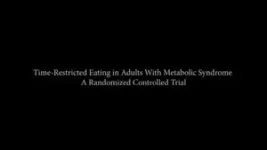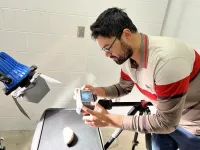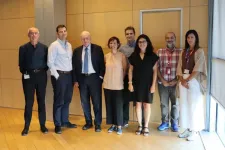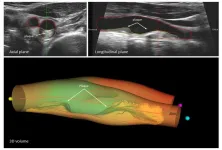(Press-News.org) LA JOLLA (Sept 30, 2024)—More than one-third of adults in the United States have metabolic syndrome, a cluster of conditions that significantly raise a person’s risk of heart disease, stroke, and type 2 diabetes. These conditions include high blood pressure, elevated blood sugar, excess abdominal fat, and abnormal cholesterol levels.
In a new clinical trial, researchers at the Salk Institute and University of California San Diego School of Medicine found that time-restricted eating—also known as intermittent fasting—could offer significant health benefits to adults with metabolic syndrome. Patients who ate within a consistent eight-to-ten-hour window each day for three months saw improvements in several markers of blood sugar regulation and metabolic function compared to those who received standard treatments.
“Our bodies actually process sugars and fats very differently depending on the time of day,” says Salk Professor Satchidananda Panda, co-corresponding author of the study and holder of the Rita and Richard Atkinson Chair. “In time-restricted eating, we are re-engaging the body’s natural wisdom and harnessing its daily rhythms to restore metabolism and improve health.”
The TIMET study is the first to evaluate the benefits of a customized time-restricted eating schedule in patients taking medication for metabolic syndrome. The results were published on September 30, 2024, in Annals of Internal Medicine.
“For many patients, metabolic syndrome is the tipping point that leads to serious and chronic diseases like diabetes and heart disease,” says co-corresponding author Pam Taub, professor of medicine at the UC San Diego School of Medicine and a cardiologist at UC San Diego Health. “There is an urgent need for more effective lifestyle interventions that are accessible, affordable, and sustainable for the average American.”
Western diets high in sugar, salt, and fat, combined with increasingly sedentary lifestyles, are thought to have contributed to the rising rates of metabolic dysfunction. While the initial recommendation may be to “eat less and move more,” these lifestyle changes are difficult for most people to sustain long-term. The researchers say time-restricted eating offers a more practical approach accessible to a wider range of patients, including those already on medication.
“Unlike expensive pharmaceuticals like Ozempic, which require lifetime use, time-restricted eating is a simple lifestyle change that doesn’t cause side effects and can be maintained indefinitely,” says first author Emily Manoogian, a staff scientist in Panda’s lab at Salk. “Patients appreciate that they don’t have to change what they eat, just when they eat.”
In the new study, time-restricted eating protocols were customized to each participant’s eating habits, sleep/wake schedules, and personal commitments. The resulting regimen had them reduce their eating window to a consistent eight to ten hours per day, beginning at least one hour after waking up and ending at least three hours before going to sleep. Manoogian says this personalized approach made the intervention easier for patients to complete, compared to other intermittent fasting studies, which typically assign the same strict time window to all participants.
The TIMET study also accepted participants who were on medication for metabolic syndrome—a group usually excluded from such trials. This makes it the first study to measure the benefits of time-restricted eating in addition to existing standard-of-care pharmacological treatments.
In the study, 108 adults with metabolic syndrome were randomly sorted into either the time-restricted eating group or the control group. Both groups continued to receive standard-of-care treatments and underwent nutritional counseling on the Mediterranean diet. Participants also logged their meals using the myCircadianClock mobile app, developed at Salk.
After three months, patients who had completed the time-restricted eating regimen showed improvements in key markers of cardiometabolic health, including blood sugar and cholesterol. They also saw lower levels of hemoglobin A1c, a marker of long-term blood sugar control. This reduction was similar in scale to what is typically achieved through more intensive interventions by the National Diabetes Prevention Program.
The time-restricted eating group also showed 3-4% greater decreases in body weight, body mass index (BMI), and abdominal trunk fat, a type of fat closely linked to metabolic disease. Importantly, these participants did not experience significant loss of lean muscle mass, which is often a concern with weight loss.
The TIMET trial adds to a growing body of evidence supporting the use of time-restricted eating as a practical, low-cost intervention to improve cardiometabolic health. The promising results suggest that healthcare providers could consider recommending the lifestyle intervention to patients with metabolic syndrome as a complement to existing treatments, though additional long-term studies are needed to determine whether time-restricted eating can sustain these benefits and ultimately reduce the risk of chronic disease.
Other authors include Monica O’Neal, Kyla Laing, and Nikko R. Gutierrez of Salk, and Michael J. Wilkinson, Justina Nguyen, David Van, Ashley Rosander, Aryana Pazargadi, Jason G. Fleischer, and Shahrokh Golshan of UC San Diego.
The work was supported by the National Institutes of Health (R01DK118278, R01CA258221, P30CA014195, UL1TR001442), the Robert Wood Johnson Foundation (76014), and the Larry L. Hillblom Foundation Postdoctoral Fellowship.
About the Salk Institute for Biological Studies:
Unlocking the secrets of life itself is the driving force behind the Salk Institute. Our team of world-class, award-winning scientists pushes the boundaries of knowledge in areas such as neuroscience, cancer research, aging, immunobiology, plant biology, computational biology, and more. Founded by Jonas Salk, developer of the first safe and effective polio vaccine, the Institute is an independent, nonprofit research organization and architectural landmark: small by choice, intimate by nature, and fearless in the face of any challenge. Learn more at www.salk.edu.
END
One in three Americans has a dysfunctional metabolism, but intermittent fasting could help
A clinical trial from the Salk Institute and University of California School of Medicine showed time-restricted eating improved cardiometabolic health in adults with metabolic syndrome
2024-09-30
ELSE PRESS RELEASES FROM THIS DATE:
Time-restricted eating associated with greater blood sugar control and fat loss than standard nutrition counseling
2024-09-30
Embargoed for release until 5:00 p.m. ET on Monday 30 September 2024
@Annalsofim
Below please find summaries of new articles that will be published in the next issue of Annals of Internal Medicine. The summaries are not intended to substitute for the full articles as a source of information. This information is under strict embargo and by taking it into possession, media representatives are committing to the terms of the embargo not only on their own behalf, but also on behalf of ...
New imaging technique brings us closer to simplified, low-cost agricultural quality assessment
2024-09-30
URBANA, Ill. – Hyperspectral imaging is a useful technique for analyzing the chemical composition of food and agricultural products. However, it is a costly and complicated procedure, which limits its practical application. A team of University of Illinois Urbana-Champaign researchers has developed a method to reconstruct hyperspectral images from standard RGB images using deep machine learning. This technique can greatly simplify the analytical process and potentially revolutionize product assessment in the agricultural industry.
“Hyperspectral ...
Purdue-led TOMI project receives $3.5M grant to turn a decade of data into new tools and strategies for tomato farmers
2024-09-30
Purdue-led TOMI project receives $3.5M grant to turn a decade of data into new tools and strategies for tomato farmers
WEST LAFAYETTE, Ind. — Indiana ranks third in the nation for tomato production. Lori Hoagland, a professor in Purdue University’s Department of Horticulture and Landscape Architecture, recently received a third grant from the U.S. Department of Agriculture’s National Institute of Food and Agriculture (USDA-NIFA) for the Tomato Organic Management and ...
Could a bout of COVID protect you from a severe case of flu?
2024-09-30
More than 200 viruses can infect and cause disease in humans; most of us will be infected by several over the course of a lifetime. Does an encounter with one virus influence how your immune system responds to a different one? If so, how? Does it weaken your defenses, boost them, or have some other impact altogether?
These are questions Rockefeller University scientists from the Laboratory of Virology and Infectious Disease,headed by Charles M. Rice, and Weill Cornell Medicine’s Laboratory of Epigenetics and Immunity, headed by Steven Z. Josefowicz, teamed up to answer in a new study published in the journal Immunity. ...
When detecting depression, the eyes have it
2024-09-30
Hoboken, N.J., September 30, 2024 – It has been estimated that nearly 300 million people, or about 4% of the global population, are afflicted by some form of depression. But detecting it can be difficult, particularly when those affected don’t (or won't) report negative feelings to friends, family or clinicians.
Now Stevens professor Sang Won Bae is working on several AI-powered smartphone applications and systems that could non-invasively warn us, and others, that we may be becoming depressed.
“Depression is a major challenge,” says Bae. “We want to help.”
"And since most people in the world today use smartphones daily, this could ...
NRG Oncology trial implies the addition of atezolizumab concurrently to standard of care does not improve survival in limited-stage small cell lung cancer
2024-09-30
The addition of the cancer immunotherapy drug atezolizumab to the standard of care concurrent chemoradiation (cCRT) did not improve overall survival for patients with limited-stage small cell lung cancer (LS-SCLC) in the second planned interim analysis of the NRG Oncology/Alliance NRG-LU005 clinical trial. These results were recently reported during the Plenary Session of the American Society for Radiation Oncology Annual Meeting in Washington, DC.
“While atezolizumab given concurrently with chemoradiation did not improve survival, we have still learned quite a bit from these findings. With the success of the ADRIATIC trial ...
NRG Oncology trial supports radiotherapy and cisplatin should remain the standard of care for p16+ oropharyngeal cancer
2024-09-30
The NRG Oncology NRG-HN005 phase II/III clinical trial did not meet the non-inferiority criteria to proceed to the phase III portion of the study. The phase II portion of the NRG-HN005 evaluated two experimental treatment arms against a control arm for patients with p16-positive (p16+, accepted as a surrogate for HPV+ status), locoregionally advanced oropharyngeal cancer. The interim futility results were recently reported during the Plenary Session of the American Society for Radiation Oncology Annual Meeting in Washington, DC.
“This ...
Progression of subclinical atherosclerosis predicts all-cause mortality risk
2024-09-30
A study carried out at Mount Sinaí Fuster Heart Hospital in New York in collaboration with the Centro Nacional de Investigaciones Cardiovasculares (CNIC) in Madrid provides important new information about atherosclerosis, a disease in which lipids (cholesterol) and other substances accumulate in plaques on the arterial wall, causing the vessels to harden and narrow, and increasing the risk of severe cardiovascular conditions.
The study, published in The Journal of the American College of Cardiology (JACC), was led by Dr. Valentín Fuster, Director of the Cardiovascular ...
Presence of subclinical atherosclerosis is marker of mortality and its progression increases risk of death
2024-09-30
The progression of atherosclerosis in people who have no symptoms of it is independently associated with the risk of dying from any cause, according to a new study led by researchers from Mount Sinai Fuster Heart Hospital, published September 30 in the Journal of the American College of Cardiology.
This research is also the first to show that advanced imaging can detect atherosclerotic disease of the large vessels long before the appearance of symptoms—an approach that could be used worldwide to prevent cardiovascular disease and risk of death. Together, the findings ...
Wang unlocking complex heterogeneity in large spatial-temporal data with scalable quantile learning
2024-09-30
Lily Wang, Professor, Statistics, College of Engineering and Computing (CEC), received funding for the project: “Collaborative Research: Unlocking Complex Heterogeneity in Large Spatial-Temporal Data with Scalable Quantile Learning.”
Wang and her collaborator, Huixia Judy Wang, Department Chair and Professor of Statistics at The George Washington University, are developing scalable and efficient quantile learning techniques and theories to address challenges in analyzing large-scale heterogeneous spatial and temporal data. These new analytical techniques will have wide-ranging applications, revolutionizing scientists’ understanding of spatial and temporal ...
LAST 30 PRESS RELEASES:
Ten-point plan to deliver climate education unveiled by experts
Team led by UC San Diego researchers selected for prestigious global cancer prize
Study: Reported crop yield gains from breeding may be overstated
Stem cells from human baby teeth show promise for treating cerebral palsy
Chimps’ love for crystals could help us understand our own ancestors’ fascination with these stones
Vaginal estrogen therapy not linked to cancer recurrence in survivors of endometrial cancer
How estrogen helps protect women from high blood pressure
Breaking the efficiency barrier: Researchers propose multi-stage solar system to harness the full spectrum
A new name, a new beginning: Building a green energy future together
From algorithms to atoms: How artificial intelligence is accelerating the discovery of next-generation energy materials
Loneliness linked to fear of embarrassment: teen research
New MOH–NUS Fellowship launched to strengthen everyday ethics in Singapore’s healthcare sector
Sungkyunkwan University researchers develop next-generation transparent electrode without rare metal indium
What's going on inside quantum computers?: New method simplifies process tomography
This ancient plant-eater had a twisted jaw and sideways-facing teeth
Jackdaw chicks listen to adults to learn about predators
Toxic algal bloom has taken a heavy toll on mental health
Beyond silicon: SKKU team presents Indium Selenide roadmap for ultra-low-power AI and quantum computing
Sugar comforts newborn babies during painful procedures
Pollen exposure linked to poorer exam results taken at the end of secondary school
7 hours 18 mins may be optimal sleep length for avoiding type 2 diabetes precursor
Around 6 deaths a year linked to clubbing in the UK
Children’s development set back years by Covid lockdowns, study reveals
Four decades of data give unique insight into the Sun’s inner life
Urban trees can absorb more CO₂ than cars emit during summer
Fund for Science and Technology awards $15 million to Scripps Oceanography
New NIH grant advances Lupus protein research
New farm-scale biochar system could cut agricultural emissions by 75 percent while removing carbon from the atmosphere
From herbal waste to high performance clean water material: Turning traditional medicine residues into powerful biochar
New sulfur-iron biochar shows powerful ability to lock up arsenic and cadmium in contaminated soils
[Press-News.org] One in three Americans has a dysfunctional metabolism, but intermittent fasting could helpA clinical trial from the Salk Institute and University of California School of Medicine showed time-restricted eating improved cardiometabolic health in adults with metabolic syndrome





